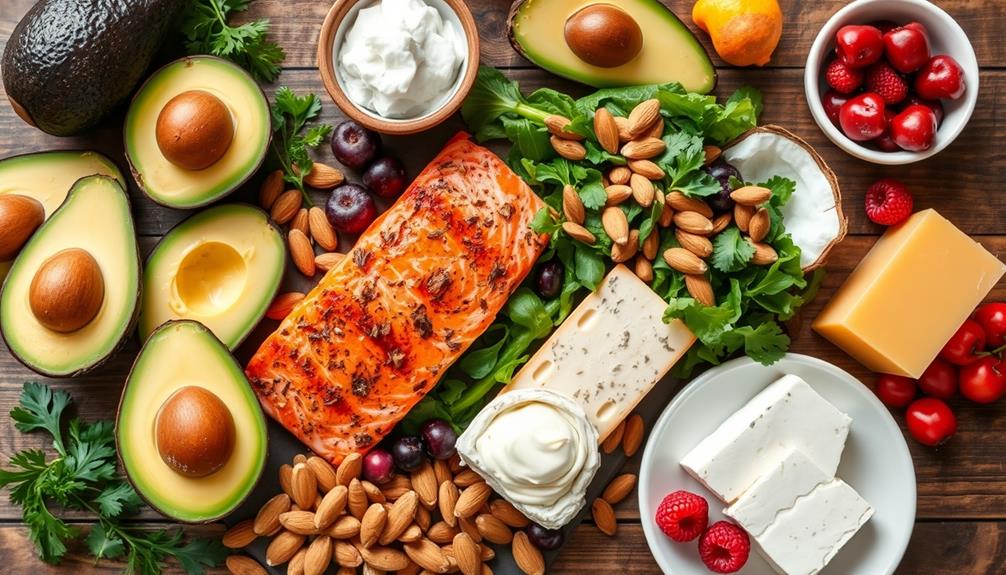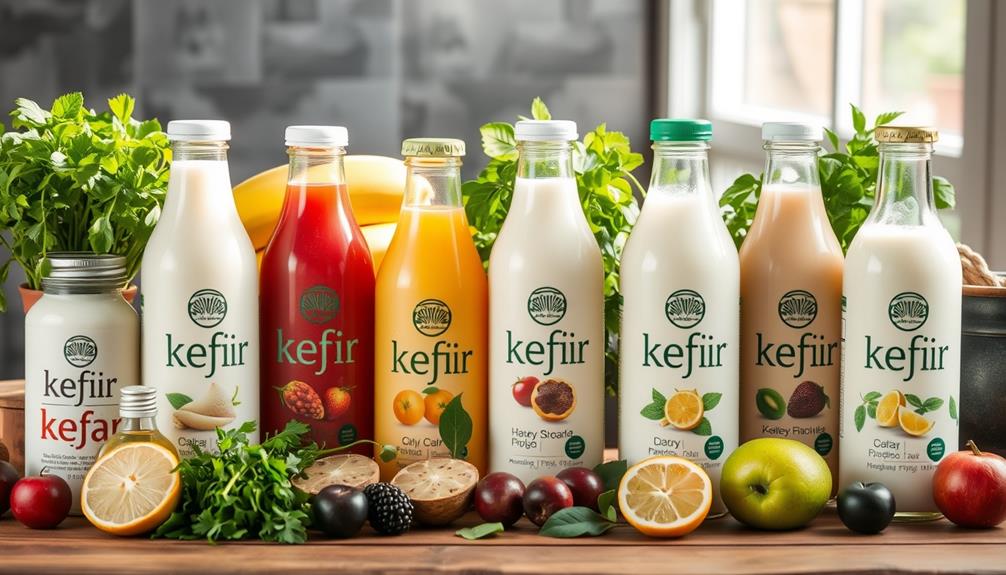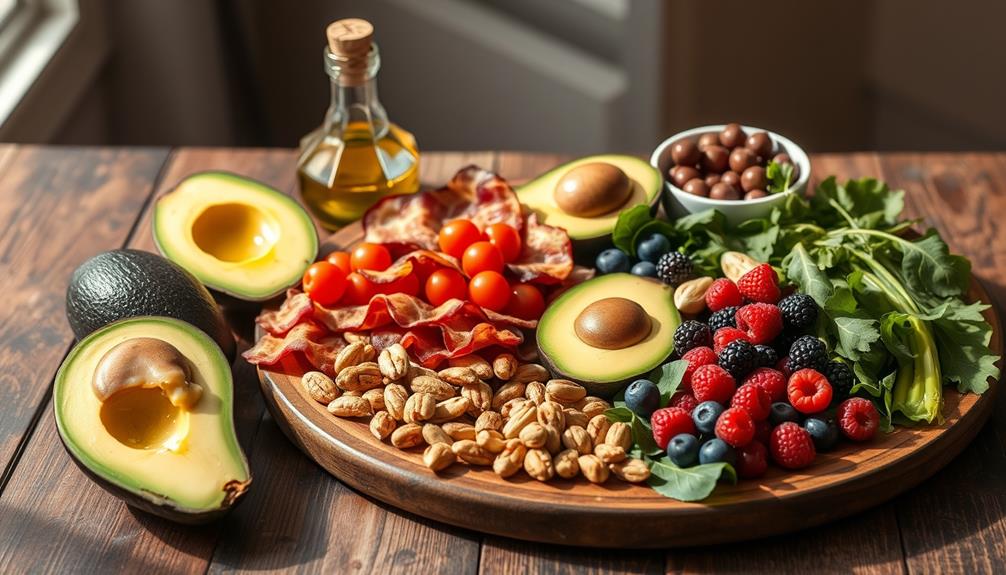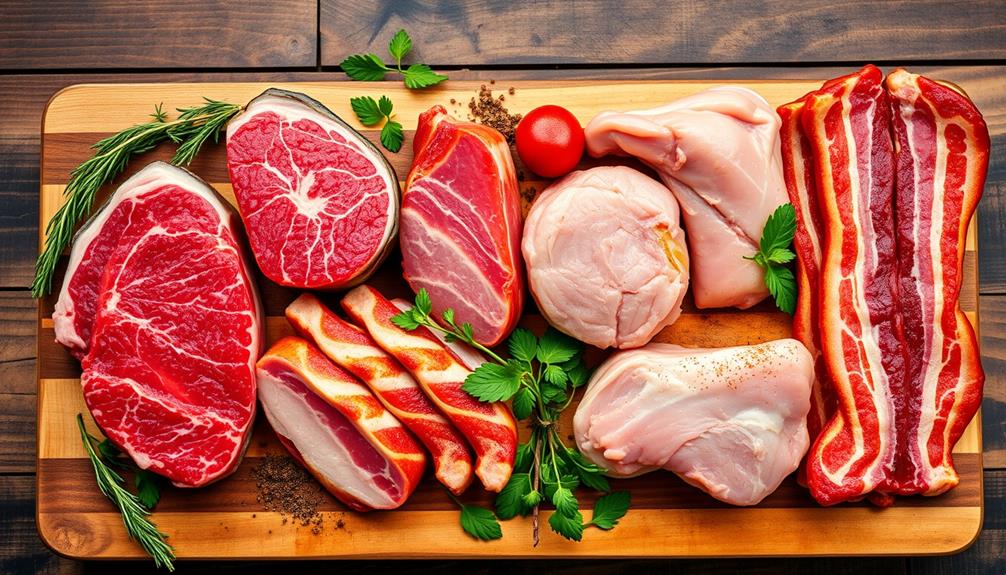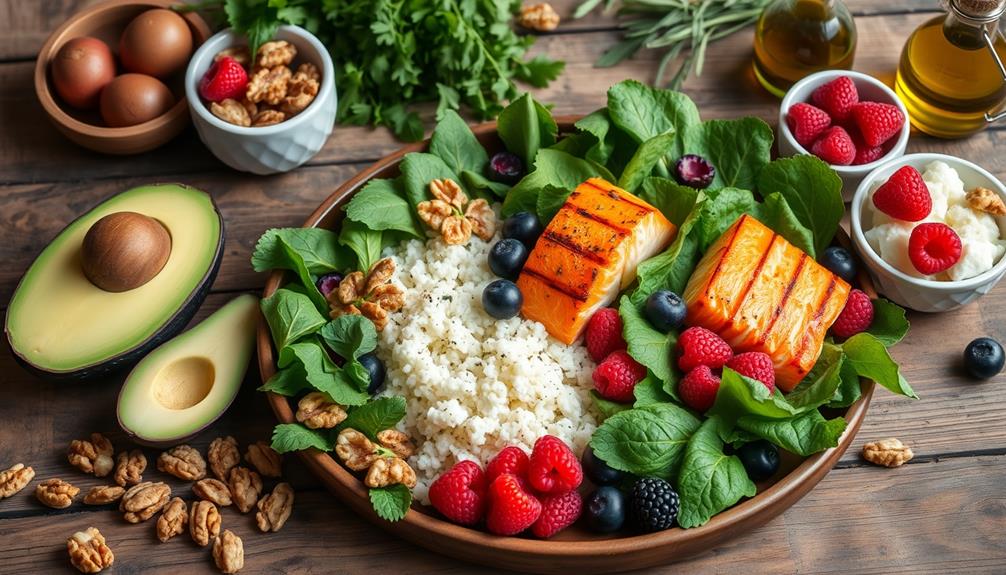The best keto diet foods are low in carbs and high in healthy fats. You should focus on high-fat meats like pork and beef, which are carb-free and protein-rich. Eggs are a great option since they have less than 1g of carbs. Don't forget full-fat dairy like cheddar cheese, along with healthy fats such as olive oil. Low-carb vegetables like spinach and cauliflower are essential for nutrients. Avoid high-carb foods like bread and sugary snacks. By incorporating these foods into your meals, you'll thrive on the keto diet and achieve your health goals, and there's so much more to explore! When it comes to beverages, don’t overlook the importance of hydration. Water should be your go-to, but you can also enjoy ketofriendly milk options like unsweetened almond milk and coconut milk. These options are low in carbs and provide a creamy texture that can be a great addition to your keto-friendly recipes. Experiment with different foods and find what works best for you on your keto journey.
Key Takeaways
- High-fat meats like pork and beef are excellent keto choices, providing protein without carbohydrates.
- Eggs are a staple, offering less than 1g of carbs and around 6g of protein each.
- Full-fat dairy products, such as cheddar cheese, are low in carbs and rich in healthy fats.
- Healthy fats, like olive oil, are essential for energy and support a ketogenic lifestyle.
- Low-carb vegetables, including spinach and cauliflower, provide necessary nutrients while keeping carb intake minimal.
Key Benefits of Keto Diet
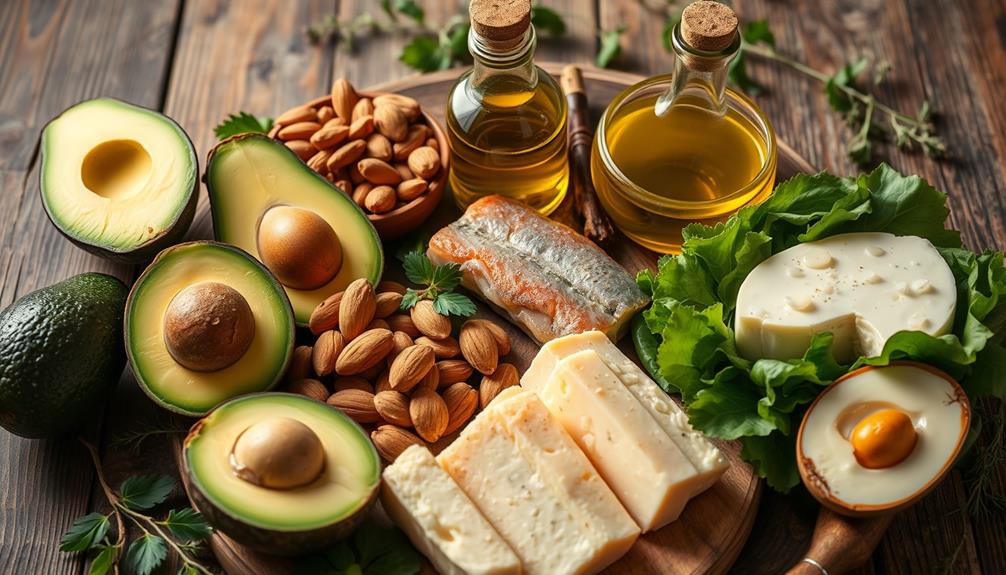
The keto diet offers several key benefits that can greatly influence your health and wellness. First and foremost, it promotes weight loss by considerably reducing your carbohydrate intake, typically to just 20 to 50 grams daily. This encourages your body to enter ketosis, using fat as its primary fuel source. As a result, many people experience improved blood sugar control and enhanced insulin sensitivity, making the keto diet a valuable option for managing type 2 diabetes.
Moreover, the emphasis on high-fat, nutrient-dense foods like fatty fish, meat, and low-carb vegetables guarantees you get essential vitamins and minerals, supporting overall health. With these changes, you might notice improvements in your cardiovascular health, including increased HDL cholesterol levels and reduced triglycerides.
Additionally, the keto diet can boost cognitive function. Many individuals report improved mental clarity and focus while in ketosis, allowing for better productivity and sharper thinking.
Essential Foods for Keto
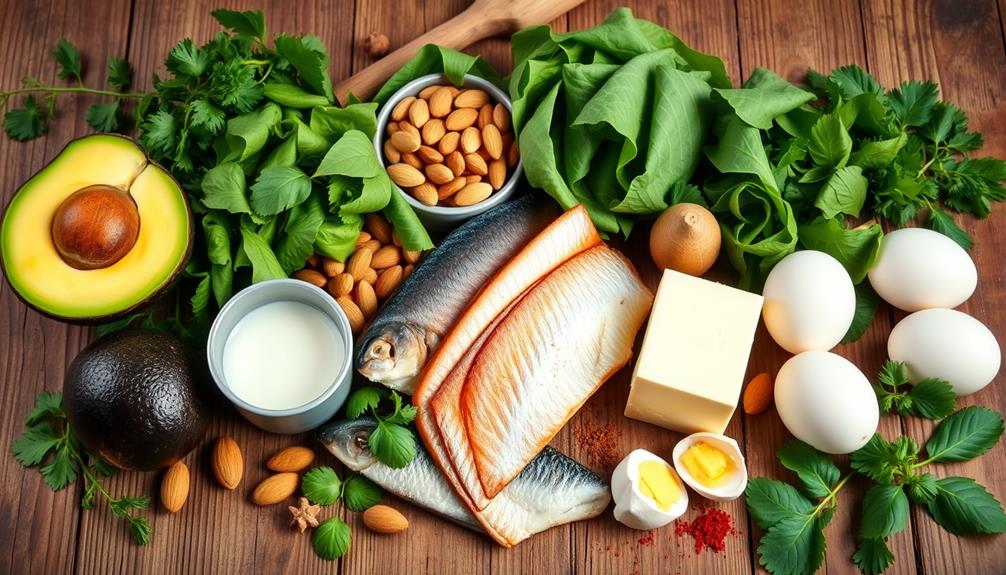
When diving into the keto diet, you'll find that choosing the right foods is essential for success. Incorporating the right mix of ingredients guarantees you stay on track and meet your nutritional needs.
Here are some must-have foods for your keto journey:
- Animal Proteins: High-fat meats like pork and beef are carb-free and packed with protein.
- Eggs: With less than 1g of carbs and around 6g of protein per egg, they're versatile and nutrient-rich.
- Dairy Products: Full-fat cheese, like cheddar, offers about 1g of carbs per ounce and is ideal for snacking.
- Healthy Fats: Olive oil, with 14g of fat per tablespoon, supports your energy levels and overall satiety.
In addition to these staples, don't forget to include low-carb vegetables such as spinach and cauliflower.
These options provide essential nutrients while keeping your carb intake low. By focusing on these essential foods, you'll guarantee your body receives the protein and healthy fats it needs to thrive on the keto diet.
Embrace these options, and you'll set yourself up for success on your keto journey.
Foods to Avoid on Keto
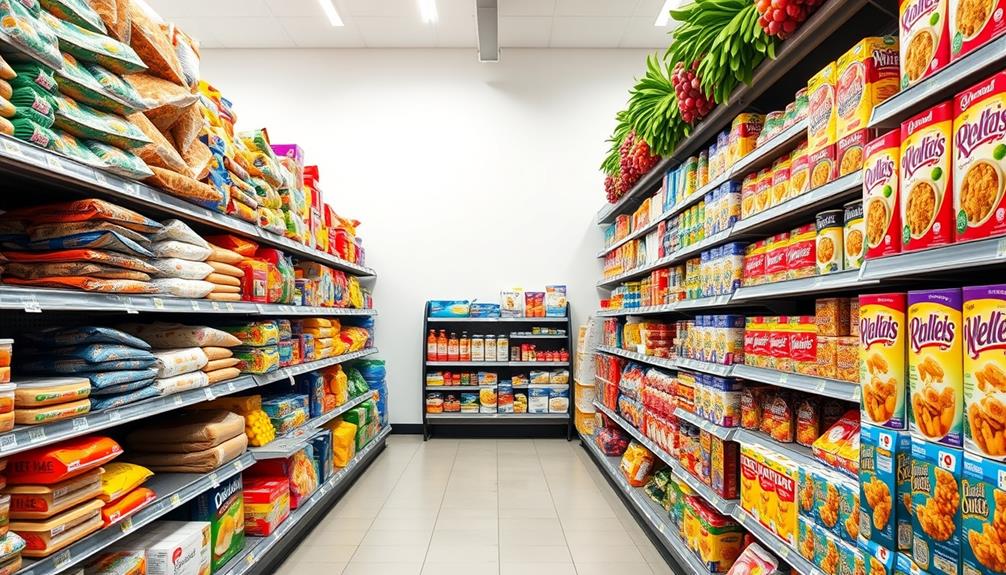
Avoiding certain foods is essential when you're on a keto diet to maintain ketosis and achieve your health goals. To succeed in a low-carb lifestyle, you need to steer clear of high-carb foods that can spike your carbohydrate intake.
Bread, pasta, rice, and grains are major culprits that can hinder your progress. Sugary foods like candy, cakes, pastries, and soft drinks are also off-limits due to their high sugar and carb content. These foods can easily derail your efforts as a keto dieter.
Additionally, be cautious with starchy vegetables such as potatoes, sweet potatoes, corn, and peas, as they contain significant carbohydrates that can impact ketosis.
Certain fruits, including bananas, apples, oranges, and grapes, should be avoided too, as their sugar levels can hinder your low-carb goals. Legumes, like black beans, chickpeas, lentils, and kidney beans, are also high in carbohydrates, making them unsuitable for maintaining ketosis.
Meal Preparation Tips
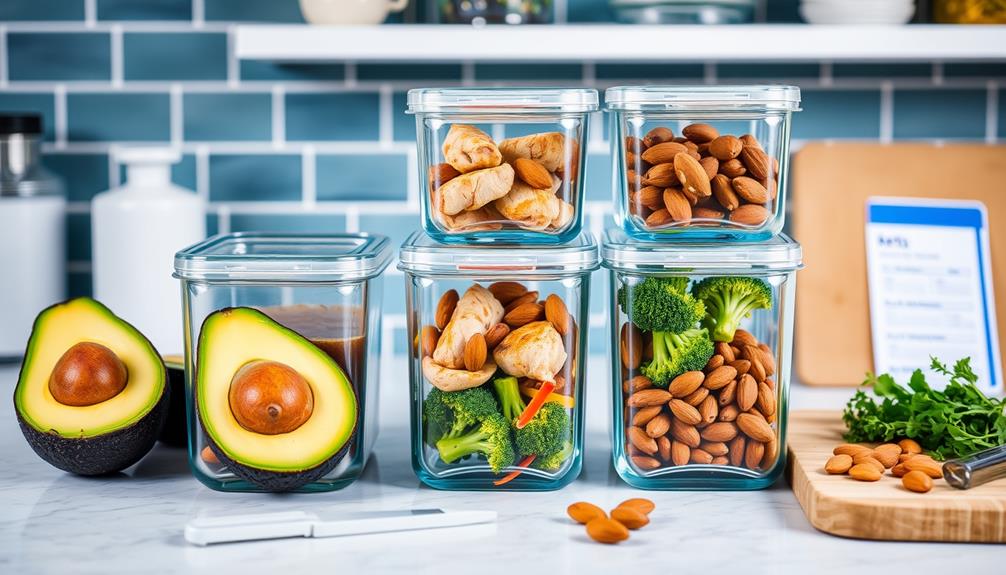
Effective meal preparation can make a significant difference in your keto journey. By planning ahead, you can guarantee a balanced intake of protein sources, healthy fats, and low-carb vegetables while adhering to your desired macronutrient ratio of 70-80% fats, 20-25% protein, and 5-10% carbohydrates.
Incorporating a balanced diet rich in fruits and vegetables can also enhance your overall health. Here are some meal prep strategies to get you started:
- Batch cook proteins like chicken and ground beef.
- Incorporate a variety of low-carb vegetables like spinach, zucchini, and cauliflower.
- Experiment with keto-friendly recipes using shirataki noodles or cheese-based tortillas.
- Use portion control for calorie-dense snacks like nuts and seeds.
Nutritional Insights and Considerations
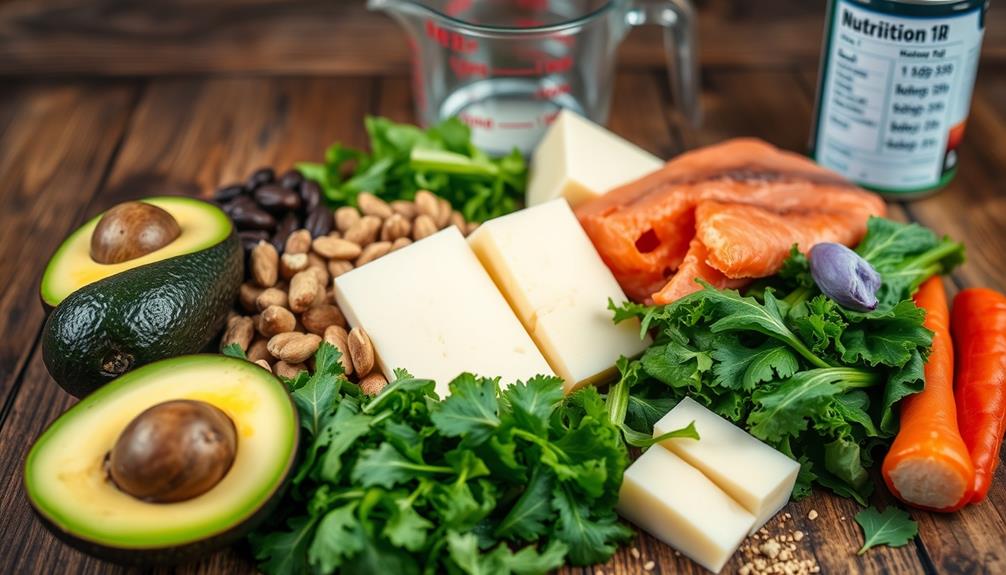
Understanding the nutritional components of the keto diet is essential for achieving your health goals. This low-carb, high-fat approach emphasizes healthy fats, protein, and essential nutrients, ensuring you maintain energy while losing weight.
Here's a quick glance at some key foods to incorporate into your meal planning:
| Food Type | Nutritional Benefits |
|---|---|
| Healthy Fats | Olive oil and avocado oil provide energy without carbs. |
| Non-Starchy Vegetables | Broccoli and zucchini are packed with vitamins while being low in calories. |
| High-Fat Dairy & Eggs | Cheddar cheese and eggs boost calcium and protein, essential for bone health. |
By focusing on high-fat dairy products, you can enjoy delicious meals while staying low in carbs. Eggs are incredibly versatile and help keep you feeling full. Remember, fatty fish also contributes omega-3 fatty acids, enhancing your overall nutrition.
Ultimately, balancing these components will help you thrive on the keto diet, making it easier to reach your health goals. Embrace the variety, and enjoy crafting satisfying meals that keep you energized!
Frequently Asked Questions
What Are the Best Foods to Eat on Keto?
When you're following a keto diet, focus on fresh meats, fatty seafood, eggs, low-carb veggies, and high-fat dairy. These foods keep your carb intake low while providing essential nutrients and satisfying your hunger.
What Is the Best Food to Get Into Keto?
Did you know that incorporating healthy fats can boost your energy levels by 30%? To get into keto, focus on fatty fish, meats, and low-carb veggies. They'll help you shift smoothly into ketosis.
What Is the Most Filling Food on Keto?
When you're looking for filling foods on keto, consider eggs, fatty fish, and cheese. They're low in carbs but high in protein and healthy fats, keeping you satisfied and helping curb your hunger effectively.
What Are the 9 Rules of Keto?
Did you know that around 80% of people find success with the keto diet? To succeed, you'll need to limit carbs, focus on healthy fats, moderate protein, stay hydrated, and choose low-carb veggies.
Conclusion
Incorporating the right keto foods into your diet can feel like opening a treasure chest of flavor and health benefits. By focusing on essential ingredients and steering clear of tempting traps, you can fuel your body and mind effectively. Remember, meal prep is your trusty map on this journey, guiding you toward delicious, satisfying meals. So, plunge in, explore new recipes, and watch as the vibrant world of keto transforms your eating habits for the better!
